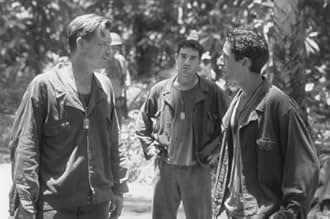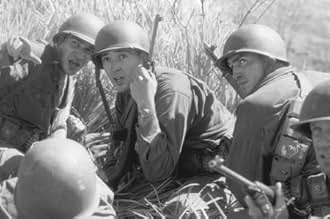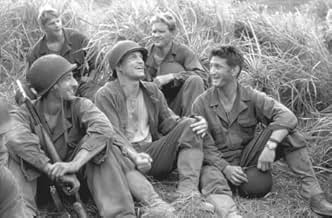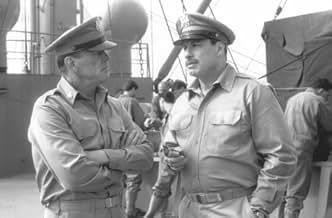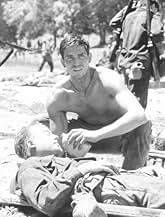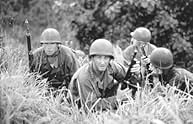Adaptação do romance autobiográfico de 1962 do James Jones, do conflito em Guadalcanal durante a Segunda Guerra Mundial.Adaptação do romance autobiográfico de 1962 do James Jones, do conflito em Guadalcanal durante a Segunda Guerra Mundial.Adaptação do romance autobiográfico de 1962 do James Jones, do conflito em Guadalcanal durante a Segunda Guerra Mundial.
- Indicado a 7 Oscars
- 23 vitórias e 47 indicações no total
- Witt's Mother
- (as Penny Allen)
- Melanesian Villager
- (as Benjamin)
- Direção
- Roteiristas
- Elenco e equipe completos
- Produção, bilheteria e muito mais no IMDbPro
Avaliações em destaque
about the oscars, i only watched the film after its surprise nomination for best picture. i had seen the competition already, and it was time to check out the fifth nominee. i went to the theatre myself, and came out three hours later, went home, and i cried. not only because i was disturbed, but i loved every single character in the film. i wanted to be there for them, cry with them, fight their battle. many people who have watched the film have said the same thing to me.
the Thin Red Line is sometimes painful to watch, but only because of its realistic juxtaposition of humanity, philosophy, and the terror of war. the film does not delve into any historical fact about Guadalcanal, except that the battle itself was terrifying (as is any battle). the characters introduce themselves through voice-over narration, which accompanies much of the action. and speaking of action, there is not much in the film. more images. images of war and the lives these soldiers left behind. this was Terence Malick's intent, of course, and many people were insulted and thought it was his own pretentious self getting the best of him. "boy he's a genius.. must he show it??" sometimes it is a little pretentious, but the film would've been "just another WWII film" if it was out of Malick's hands.
i can not understand why Sean Penn is billed as the top actor or the main character of this film. he was there a lot, but the film is carried by Jim Caviezel as the beautiful and ethereal private Witt. words can not describe this performance. with as few lines as he had, Caviezel portrays the symbolic soul of Witt, and by the end of the film he will break your heart. also excellent performances from Nick Nolte and the understated Elias Koteas, who can stretch creepy (Crash) to sympathetic in the blink of an eye.
now.. let's consider hollywood. sure they love Spielberg, and sure Private Ryan was a masterpiece (and it really was), but nobody even expected the Thin Red Line to get seven oscar nods, especially for best picture. but Shakespeare in Love was the crowd pleaser, and the other two were epic war films. most hollywood "artsy" people are anti-war.. kind of like the Thin Red Line. Private Ryan seemed to be MUCH more patriotic "pro-america" than the other. so if we've got anti-war on one side, and patriotism on the other... open and shut. the votes were split between the two, and Shakespeare emerged victorious. too bad.
anyway... the Thin Red Line was definitely better than Shakespeare, and definitely a completely different film from Spielberg's. John Toll's cinematography and Hans Zimmer's score work together to convey the tone of Malick's lyrical and poetic direction, and both should have won oscars. this film is nothing short of breath-taking, though understandably not for the average american moviegoer.
The company is not made up of conscripts but regular soldiers. Some of them have been in the Army more than 10 years. Some of them however have never seen real action before and this is a hot and uncomfortable location, despite the lovely tropical scenery. Some crack up, some die, some do heroic deeds. Their leaders are not particularly admirable; one is quite happy to get his men killed if he can come out of the action looking good.
Out of sight for most of the film are the Melanesian inhabitants, the Solomon Islanders, who are carrying on living as best they can while the war rages around them. Their serenity is in sharp contrast to the frenetic military activity. Of course, there is nowhere for them to go.
There is some action excitingly filmed but as in real wars much of the time is spent preparing and waiting. Personal stories unfold but at the end it is survival that matters.
The lighting and photography is quite superb, the lighting in particular fitting the mood perfectly. Filming was not actually on Guadalcanal but near Port Douglas in Northern Queensland where there is similar tropical rainforest and fauna but with much easier logistics. It took ages apparently but seems more than worth the effort.
This is probably one of the four or five greatest war films ever made, right up there with "All Quiet on the Western Front, " "Paths of Glory," "Bridge on the River Kwai" and "The Longest Day." Never has a movie better portrayed what it's like to be a frontline soldier.
Terrence Malick has the reputation of being an eccentric, difficult director - Kubrick without the fear of flying. Yet this is not a particularly unconventional movie - it's just that everything hangs together - the story, dialogue, performances, photography and settings. On thing is clear - this is a better interpretation of James Jones' novel than the 1964 version.
The Thin Red Line asks a lot of good questions about death, war, and the ultimate meaning of life. Now that I have seen it, I'm very surprised that this film did not win picture of the year. Spielberg's film was a gritty, realistic portrayal of war. But it was also highly commercial and had a very contrived plot. In comparison, this film sort of wanders through itself and in the process helps to put you in the boots of the soldiers it portrays.
My only criticism is perhaps the film was a bit long, but I never noticed that the second time through. I can't praise this film enough. Excellent work.
Director Terrence Malick's films are alive with a sense of pure cinema with every frame delivering such detail and richness that you could swear you were there. The only other person capable of bringing such an immediate sense of time and place and sheer nuance of film (although in a completely different way) is David Lean, another major league craftsman.
Here, again, Malick uses his customary voice-over device although this time as a means of vocalising the abstract thoughts of the various soldiers as they struggle to make some sense of the conflict. It's an interesting approach which allows the audience to identify with the characters in a far less superficial way than in, say, SAVING PRIVATE RYAN (the film THE THIN RED LINE is most often and most unfairly compared to). Malick is also not afraid to take time to illustrate the continuing natural backdrop to the carnage. Mother Nature almost seems to be occupying a pivotal supporting role as a detached observer on the sidelines, calmly and inscrutably watching the chaos develop.
It's a measure of Malick's complete disinterest with the normal conventions of Hollywood that actors such as Lucas Haas, Vigo Mortensen, Jason Patric, Mickey Rourke, Martin Sheen and Billy Bob Thornton all spent months in Queensland Australia and the Solomon Islands filming roles that ultimately ended up on the cutting room floor. Blink and you'll also miss major marquee players such as John Travolta and George Clooney. The stand-out performances come from Jim Caviezel and, especially, Nick Nolte.
Nolte just seems to be getting better and better as he gets older and his portrayal of tyrant Colonel Tall is something to see. I have never seen anyone express such an impotent sense of rage, anger and fury than Nolte does here. It's a fantastic performance from a real pro and it's a mystery to me why he didn't get an Oscar.
John Toll's pristine cinematography and Hans Zimmer's wonderfully evocative (Oscar-winning) score are other strong elements. The unusual music and visuals contrast so well that Malick sometimes fades out the noise of the shouting, explosions and guns, an effect that only serves to heighten the emotional power of the experience further.
You won't see a more beautiful film about the horrors of war. Movies like this make the task of trawling through the weekly diet of dumb formulaic junk served up by Hollywood almost seem worthwhile.
Você sabia?
- CuriosidadesMost of Adrien Brody's scenes were cut from the film and he wasn't aware of these changes until he saw the film at the premiere. Brody came to the premiere expecting to see himself as the lead character and was shocked when he saw that he was barely featured in the film, especially since Cpl. Fife was the central character in the novel on which the movie was based.
- Erros de gravaçãoIn one of the flashback scenes where the soldier and his girlfriend are holding hands, modern cars can be seen out the window in the background.
- Citações
Private Edward P. Train: [narration] This great evil, where's it come from? How'd it steal into the world? What seed, what root did it grow from? Who's doing this? Who's killing us, robbing us of life and light, mocking us with the sight of what we might've known? Does our ruin benefit the earth, does it help the grass to grow, the sun to shine? Is this darkness in you, too? Have you passed through this night?
- Cenas durante ou pós-créditosComposer Wrangler. . . Moanike'ala Nakamoto
- ConexõesFeatured in HBO First Look: The Thin Red Line (1998)
- Trilhas sonorasThe Unanswered Question
Composed by Charles Ives
Performed by Orchestra of St. Luke's (as The Orchestra of St. Luke's)
Conducted by John Adams
Principais escolhas
- How long is The Thin Red Line?Fornecido pela Alexa
Detalhes
- Data de lançamento
- País de origem
- Idiomas
- Também conhecido como
- La delgada línea roja
- Locações de filme
- Empresas de produção
- Consulte mais créditos da empresa na IMDbPro
Bilheteria
- Orçamento
- US$ 52.000.000 (estimativa)
- Faturamento bruto nos EUA e Canadá
- US$ 36.400.491
- Fim de semana de estreia nos EUA e Canadá
- US$ 282.534
- 27 de dez. de 1998
- Faturamento bruto mundial
- US$ 98.126.565
- Tempo de duração
- 2 h 50 min(170 min)
- Cor
- Mixagem de som
- Proporção
- 2.35 : 1





